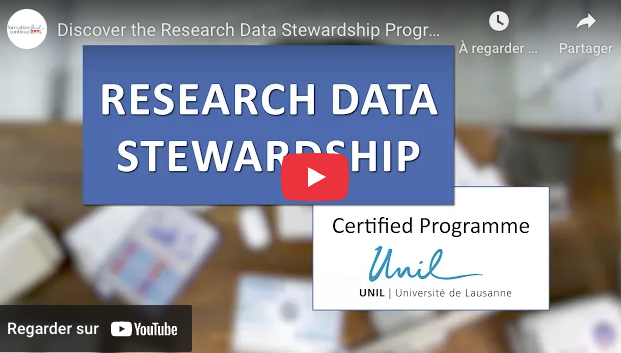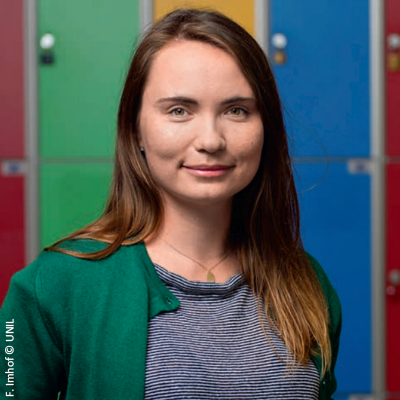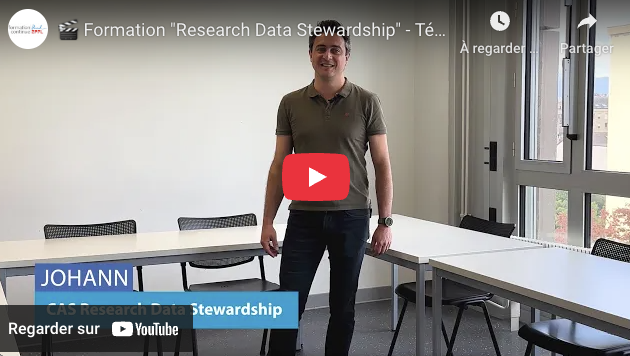TARGET AUDIENCE
Professionals providing advice and support to researchers in the field of research data management: data stewards, other data professionals, researchers, information management specialists, librarians, research support staff, etc.
OVERVIEW
Nowadays, not only research projects generate large and complex datasets, but the sharing and reuse of information resulting from research work constitutes one of the foundations of contemporary science. In such a context, how to handle data throughout a research project according to best practices and standards?
By empowering scientists to manage and share their data properly, Data Stewards have emerged as a new sought-after professional profile in the landscape of research. Able to holistically address a wide range of questions related to legal frameworks, ethics, data protection, IT tools and security, FAIR and CARE principles or Open Research Data, they play an important role throughout the entire data lifecycle, supporting each stage from initial collection to final preservation and dissemination.
OBJECTIVES
- To develop a solid knowledge on methodological, technical, ethical, legal, and data security aspects of research data management.
- To promote best practices at each stage of a research project to properly plan, collect, organise, document, store, share, preserve and reuse data.
- To be able to support and advise researchers for the management of their research data at every stage of the data lifecycle.
- To understand the institutional research environment, including the principles of Open Science and Open Research Data, and their implications for data management.
- To understand the role, responsibilities, and positioning of Data Stewards within an institution, and develop the ability to communicate about them.
PROGRAMME
In the short video below, Alexandra Stam and Gérard Bagnoud present the advantages of this dynamic and practical programme:

The Certificate of Advanced Studies in Research Data Stewardship consists of a compulsory core curriculum of three modules, followed by a certification module depending on the chosen orientation.
CORE MODULE 1 – RESEARCH DATA MANAGEMENT: BACKGROUND, GENERAL INFORMATION AND LEGAL FRAMEWORK
26-27 March, 23-24 April, and 7-8 May 2026
6 days of teaching (42 hours of teaching + approx. 58 hours of personal work)
Objectives:
- To understand the principles of Open Science and Open Research Data, and their implications for research data management, including legal, ethical, and security considerations.
- To develop a solid knowledge of the best practices in data management, to provide researchers with informed guidance throughout the research and data lifecycle – covering aspects such as the role of Data Stewards, Data Management Plans, and FAIR principles.
- To identify and evaluate suitable data infrastructures, distinguishing between storage, archiving, and sharing solutions, and advising researchers on how to enhance the value, accessibility, and reuse of their data.
Module and lesson leaders: René Schneider (HEG, HES-SO Genève), Georg Lutz (FORS, UNIL), Carmen Jambé (UNIL), Melanie Röthlisberger (UZH), Mikhaël Salamin (UNIL), Pablo Diaz (UNIL), Fabio Molo (UZH).
CORE MODULE 2 – VISIBILITY OF ACTIVITIES AND NETWORKING
21, 22 and 28 May 2026
3 days of teaching (21 hours of teaching + approx. 54 hours of personal work)
Objectives:
- To understand the institutional research environment, including policies, organisational structures, and strategic challenges.
- To know the roles related to research data management, particularly the role, responsibilities, and positioning of Data Stewards within the institution.
- To be able to communicate about Data Stewardship, including the institutional policy and the support and services offered.
Module and lesson leaders: Carmen Jambé (UNIL), Gérard Bagnoud (UNIL), René Schneider (HEG, HES-SO Genève), Melanie Röthlisberger (UNIL).
CORE MODULE 3 – ADVISORY AND TECHNICAL SUPPORT
11 and 12 June 2026
2 days of teaching (14 hours of teaching + approx. 36 hours of personal work)
Objectives:
- To acquire or reinforce technical skills necessary to support and advise researchers in using IT tools.
- To know how to use current file format standards and metadata schemas effectively.
- To be able to apply best practices for documenting and organising data to ensure quality, completeness, consistency, and long-term preservation.
Module and lesson leaders: Auriane Marmier (FORS), Martin Grandjean (UNIL), Thé Van Luong (UNIL).
CERTIFICATION MODULE (to choose from) – Participants must choose one of the following orientations, which reinforces the knowledge covered in the core modules according to the specific needs of that orientation:
Independent work on the certificate project, with 7 hours of coaching sessions organised between June and September 2026.
Module content:
- Strengthen the knowledge gained in the core modules and reflect on its application in professional practice.
Assessment:
- Dissertation and poster on a freely chosen topic.
Module leader: René Schneider (HEG, HES-SO Genève).
27-28 August, and 10-11 September 2026
Module content:
- Best practices for biology and life sciences data: FAIR principles, DMP/RDM, etc.
- Technical skills: introduction to Linux/Unix and Git, metadata, and documentation.
- Data sharing and reuse via specialised databases and institutional repositories.
Assessment:
- Exercise and synthesis assignment.
Module leader: Vassilios Ioannidis (SIB)
24 September, 1, 8, and 9 October 2026
Module content:
- Best practices for humanities and social sciences data: DMP/RDM, data ethics, etc.
- Documentation, informed content, and anonymisation.
- Data sharing, reproducibility and reuse.
Assessment:
- Exercise and synthesis assignment.
Module leaders: Alexandra Stam (FORS), Auriane Marmier (FORS), Rita Gautschy (DaSCH).
CURSUS & CERTIFICATION
Cursus
The Certificate of Advanced Studies (CAS) in Research Data Stewardship represents 300 hours:
- 3 core modules (77 hours of teaching + 148 hours of personal work).
- 1 certification module to choose from:
- Transdisciplinary Orientation
(7 hours of coaching + approx. 68 hours of personal work) - Biology and Medical Sciences Orientation
(28 hours of teaching + approx. 47 hours of personal work) - Social Sciences and Humanities Orientation
(28 hours of teaching + approx. 47 hours of personal work)
- Transdisciplinary Orientation
Certification
Participants who successfully complete the course will receive a Certificate of Advanced Studies (CAS) in Research Data Stewardship, delivered by the University of Lausanne, with 12 ECTS credits.
Consult the Academic Regulations, in French.
Testimonials from participants
“This course allowed me to reinforce my knowledge about the legal framework of data protection, the FAIR principles and the ethical issues related to AI tools. Scientific research is constantly evolving. For those working in research support, it is essential to keep up with these changes and sometimes even be the messengers of them. As each institution adapts in its own way to the new needs that emerge in research data management, exchanging ideas with other professionals was a particularly interesting part of the course.”
Ellina
Data Steward


“The course allowed me to develop a structured understanding of the tasks a data steward can perform within the complex landscape of Swiss research organizations. I appreciated exchanging ideas with experienced lecturers and participants from various backgrounds. I established valuable professional contacts for future collaborations. This was a great opportunity for networking.”
Gorka
Scientific Staff & Data Steward
ORGANISATION
Organising entity
Faculty of Social and Political Sciences, University of Lausanne (UNIL), in collaboration with:
- Swiss Centre of Expertise in the Social Sciences (FORS)
- University of Teacher Education, State of Vaud (HEP Vaud)
- University of Applied Sciences Western Switzerland (HES-SO)
- Swiss Institute of Bioinformatics (SIB)
- University of Geneva (UNIGE)
- University of Zurich (UZH)
- Zurich University of Applied Sciences (ZHAW)
Academic Director
- Prof. Georg Lutz, Faculty of Social and Political Sciences, University of Lausanne & Director of the Swiss Centre of Expertise in the Social Sciences (FORS)
Scientific Committee
- Gérard Bagnoud, Director of Information Resources and Archives Department (UNIRIS), University of Lausanne & Open Science Coordinator
- Marielle Guirlet, Programme Coordinator & Specialist in research data management, Information Resources and Archives Department (UNIRIS), University of Lausanne
- Vassilios Ioannidis, Director of the FAIR Data Management Unit, Vital-IT group, Swiss Institute of Bioinformatics
- Carmen Jambé, Head of the “Research Data” sector and of the network of research data specialists, Information Resources and Archives Department (UNIRIS), University of Lausanne
- Prof. Georg Lutz, Faculty of Social and Political Sciences, University of Lausanne & Director of the Swiss Centre of Expertise in the Social Sciences (FORS)
- Mathilde Panes, Open Science Manager, University of Teacher Education, State of Vaud (HEP Vaud)
- Prof. René Schneider, Chairman of the Department of Information Science, Geneva School of Business Administration (HEG-Genève), HES-SO
- Alexandra Stam, Director of Data Management Services (DMS), Swiss Centre of Expertise in the Social Sciences (FORS)
Contact
Marielle Guirlet, Programme Coordinator: cas-datastewardship@unil.ch
PRACTICAL INFORMATION
Language
The course will be given in English
Course venue
UNIL-EPFL Campus, Lausanne, Switzerland
Dates
From March to October 2026
Course fee*
6,000 Swiss Francs**
* Based on the price of the last edition
** Payment in instalments possible
REGISTRATION
Admission requirements
- Hold a bachelor’s or master’s degree from a Swiss or foreign university (HEU), from a University of Applied Sciences (HES), or another title deemed equivalent by the Steering Committee, and
- Have a minimum of 2 years of professional experience in research or in a field related to the CAS.
Registration
Admission on file to submit to Formation Continue UNIL-EPFL. Fill in the online registration form and upload your CV, a letter of motivation, and copies of the most recent or highest-level diplomas.
Registration deadline
This course is full. Registrations are closed.
Be alerted as soon as registration opens for the next edition of this course, register on our Stay Informed platform.




